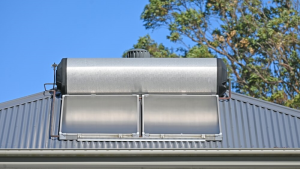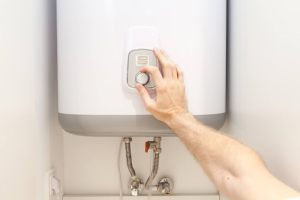Whether you’re looking to install a brand-new hot water system or replace an outdated one, it’s important you have the basics covered to help make your decision. In this guide, we cover everything you need to know to make the best decision for your home when it comes to hot water systems.
What’s in our guide?
What is a hot water system?
A hot water system is a water heating appliance that consists of a storage tank that maximises heating capacity to deliver hot water into the home. There are many different types of hot water systems that can be installed in a home, each with its own set of benefits and features.
Types of hot water systems
There are two main types of hot water systems: storage systems and continuous flow (or instantaneous) systems − available with either electricity, gas (LPG or natural gas), or solar power.
Storage hot water system
This system is comprised of an insulated tank where water is always heated. Cold water is heated by copper or nickel-chrome alloy elements inside the storage tank. These can be installed indoors or outdoors. Larger units can easily supply hot water to multiple outlets at the same time, meaning you can run the hot tap in the kitchen without losing hot water to the shower.
Instantaneous hot water system
Instantaneous hot water systems, also known as a continuous flow or tankless system, don’t have storage tanks, and heat water instantly (hence the name) by flowing through a coiled pipe called a heat exchanger. Continuous flow systems are more suited to smaller households where space is limited, and are considered more energy efficient because there’s no heat loss from a tank. The downside is that there could be a slight delay in heating up the water.
Read more: Your complete guide to hot water systems
Which hot water system is best?
Like all choices when it comes to appliances, it comes down to personal preference. Here is a short list of points that can alter your choice surrounding which type of heating system is best for your needs:
- The available power source(s) at your property (i.e., natural gas connection, solar, etc.).
- How big your household is and your average water usage (i.e., larger families may benefit from gas-powered systems).
- How much space you have at home (i.e., electric continuous flow systems are best for smaller homes).
- Your budget (i.e., if you want to invest in a top-of-line system or simply change your connection).
- If you want to keep running costs to a minimum (i.e., go green with a solar-powered or a gas-powered system).
Solar hot water system pros and cons

Like anything, there are a number of pros and cons to any appliance or system. For solar hot water systems, some of the pros and cons include:
Pros:
- Cheapest to run
- Customers may be eligible for rebates and government incentives
- Fitted with gas or electric fuel booster for overcast days
- Most environmentally friendly option available
Cons:
- Require sufficient roof space for installation
- Require direct sunlight to function which can cap peak times to certain hours of the day
Electric hot water system pros and cons
Electric hot water systems are possibly one of the better-known hot water systems but come with their own pros and cons including:
Pros:
- Low upfront cost
- Easy to install
- Produce hot water on demand
- Can make use of off-peak times
Cons:
- Inefficient to run
- Storage tanks can take up a lot of space
- Can become expensive to run if using a continuous tariff
Gas hot water system pros and cons
Gas hot water systems are a versatile type of hot water systems but also share their own pros and cons including:
Pros:
- Cheaper to run with a natural gas connection
- Supply hot water even during a power outage
- No off-peak tariffs to worry about
- Fewer greenhouse gas emissions
Cons:
- More expensive to buy and install outright
- Need specific placement for ventilation
- If natural gas isn’t available, LPG gas becomes a more expensive choice
How much does a hot water system cost to install?
The cost to install a hot water system can range from $1,000 to upwards of $7,000. There are a number of factors that contribute to the increase in price, a major one being whether you’re installing a brand-new system or upgrading or switching to a new system. A brand-new installation can cost more if you need additional setup and connection, as well as all the required pieces of equipment.
Solar hot water system installation cost
Solar water heaters are the most energy-efficient of all hot water systems, but they’re the most expensive to install, costing from $3,000 to $7,000. This is because there’s an added level of complexity with solar hot water systems, including whether you use a flat plate or evacuated tube collectors, which backup system you use, the configuration of your roof, and so on.
If you’re replacing an existing solar hot water system it will generally be cheaper. With the hardware already in place the only items that may need replacing would be one or two solar panels as well as valves.
Read more: Solar hot water system prices & usage costs
Electric hot water system installation cost

Electric water heaters are the cheapest to install − typically costing between $1,000 and $2,000 – inclusive of the cost of the unit, materials, labour, and fittings. This is because they’re fairly easy to install. They connect to existing electric power outlets and operate on quite a simple mechanism. Systems requiring an electrical upgrade or repositioning will cost more to install.
Replacing your hot water system and installing an electric system will cost you $300 to $700. They are a simple system to change out with a similar model and a majority of the costs will be associated with the labour and fittings.
Read more: How to reduce the cost of your hot water bill
Gas hot water installation cost
Both storage and instantaneous gas water heaters are slightly more expensive to install than their electric counterparts, depending on whether you already have an accessible gas supply line or not. Costs will vary typically between $1,500 and $3,000. If you don’t have a connection to natural gas there is the option to use LPG bottles, but you’ll need to organise bottle swaps.
If you’re looking to replace an existing hot water system with a gas one it will typically cost between $500 and $800. Replacements are cheaper to install because they don’t involve too much labour if a gas connection is already available from an existing unit.
Read more: Gas hot water system prices & usage costs
Factors to consider for hot water system installation
Each type of hot water system has its individual elements and factors that impact the cost. When looking to install a new hot water system it’s worthwhile taking these points into consideration:
- Your household’s water usage: depending on your household’s hot water usage – families will use more water whereas smaller households will use less – you can determine which type of unit is more economical.
- Tank size: There are a number of tank sizes available, with the larger the tank size, the more it will likely cost upfront.
- The type of system you choose: electric hot water systems are the cheapest option but they may not suit your home long term. Weigh up all options and how they can positively impact your home.
- Labour costs: All hot water systems need to be installed by a licensed plumber and possibly an electrician. Plumbers and electricians can charge between $80 and $120 an hour, are a necessary cost to factor into your budget.
Should I invest in a hot water system?
Investing in a hot water system may seem like a big commitment but can help you save money and guarantee you’ve always got hot water year-round. Whether you’re looking for a gas, electric, or solar hot water system, each has its own benefits that could suit your home. Compare hot water systems to see which might be the right choice for you.
Original Author: Megan Birot



Share this article